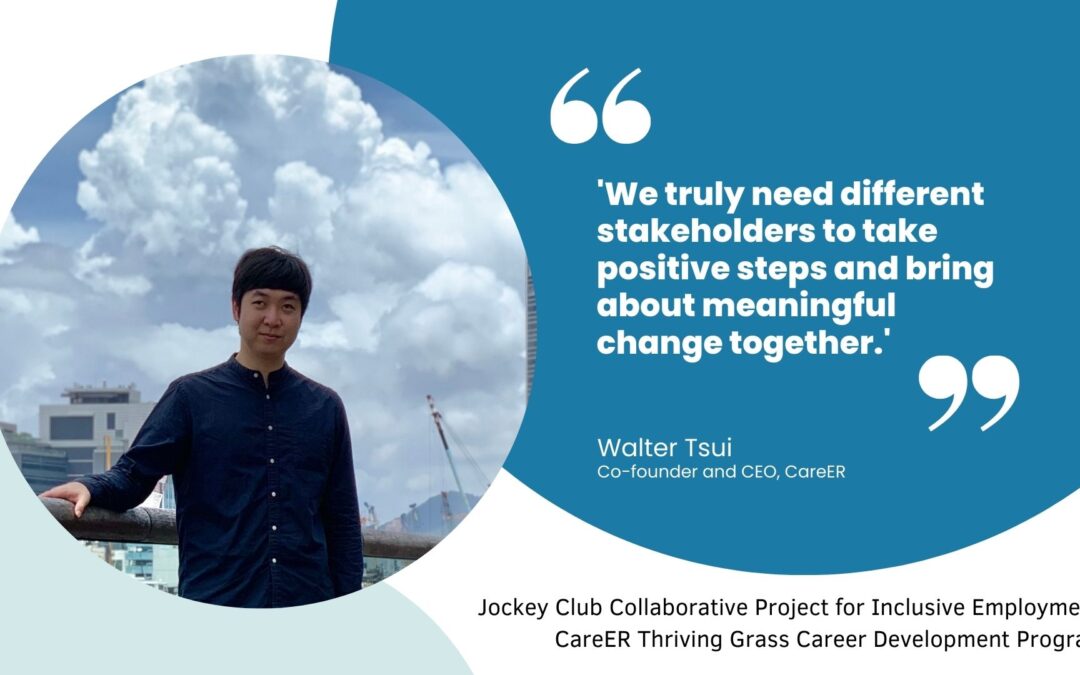With the funding from The Hong Kong Jockey Club Charities Trust, the (Full project name should be named) CareER Thriving Grass Career Development Program (Thriving Grass Program) began as a 3-year program in 2021. The program provides job internships, professional training, coaching and counselling to higher-educated students and graduates with disabilities and Special Educational Needs (SENs) in Hong Kong. It is not only a learning journey for the candidates but also empowers the participating inclusive employers.
This year, the pioneering job-matching program has successfully partnered 49 members with inclusive employers, ranging from large corporations to startups, and social enterprises to non-profit organizations in Hong Kong. Seven of the interns have received a return employment offer.
Now half way through this program, Walter Tsui, Co-Founder and CEO of CareER, was happy to share the program’s advantages, challenges and prospects.
The Advantages
CareER is a platform for persons with disabilities and SENs to secure work experience. Over the years, our members have often been offered full-time positions after the summer internship program, and they have been willing to share their experiences with other fellows. Peer support effectively helps candidates with less experience to build confidence and self-esteem. It is undoubtedly the best way to acquire and build knowledge in job hunting, interviewing, etc. It also forms a solid community and invaluable friendships among members, which is what we have aimed for since the day we founded CareER.
Our amazing CareER Team plays an important role too. The team provides professional training, counselling and job matching for the students. For the employers, we provide practical information and resources in preparing Corporations or Organisations to hire and accommodate people with differences, and the support continues throughout the internship period. The team often works overtime, but they genuinely walk together with our members and connect with inclusive employers who value people’s capabilities. I treasure this fantastic team a lot.
Moreover, we are grateful to have the Jockey Club Collaborative Project for Inclusive Employment to help us team up with other NGO partners and SENs-aware professionals like Heep Hong Society, SAHK, St. James Settlement and The University of Hong Kong. These partners help us understand different kinds of disabilities or SENs, such as Autism Spectrum Disorder (ASD), Person in Recovery (PIR), and chronic patients, for instance. The learning helps us to provide a comprehensive program that can accommodate all kinds of disabilities or SENs. We undoubtedly need different stakeholders to take positive steps and bring about meaningful change together.
The Challenges
The whole world is suffering from the impact of COVID-19, and there is considerable brain drain as a result of the mass migration wave from our city. There are fears that the loss of workforce and the yet-to-grasp economic impact will affect Corporations’ Diversity and Inclusion (D&I) commitments.
The prolonged slump will also challenge employees’ and students’ mental well-being. It may be a hurdle for our team, but I believe we will transform the pressure into motivation. We will maintain quality employment support for our members and partnering Corporations, utilising different resources to improve employability and raise workplace confidence. We will also focus more on coaching and counselling to strengthen our members’ competencies under the changing circumstances.
We are happy to see increasing numbers of employers implementing D&I employment, but the mindset needs to change. Instead of providing preferential or special treatment, we need to consider people with disabilities or SENs like everyone else. A company should not feel like they are “heroes” who give a helping hand to hire disabled people.
The Prospects
With more and more employers willing to embark on the D&I Journey, we hope more people will understand that disabilities have different levels of functional ability instead of the false assumption of “All or Nothing”. Indeed, 10% of our population has disabilities, meaning there is one person with special educational needs out of every ten. People with disabilities need equal opportunities in all areas. We therefore hope to increase the hiring rate for people with differences in our community.


